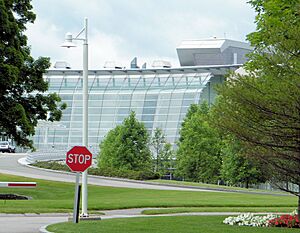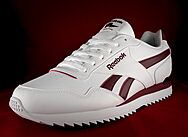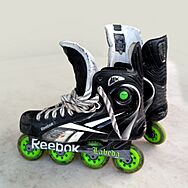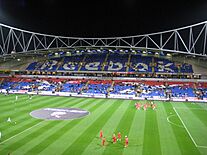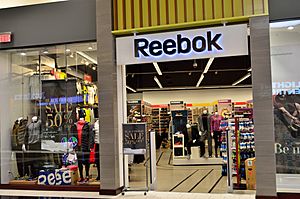Reebok facts for kids
 |
|

Reebok Wordmark.
|
|
|
Formerly
|
Reebok |
|---|---|
|
|
| Industry | Textile, Sports equipment |
| Predecessor | J.W. Foster and Sons |
| Founded | 1958 in Bolton, England |
| Founder | Jeff and Joe Foster |
| Headquarters |
|
|
Area served
|
Worldwide |
|
Key people
|
Todd Krinsky (CEO) |
| Products | Sportswear, footwear |
| Brands |
List
|
| Parent |
|
Reebok International Limited is a well-known American brand that makes shoes and clothes for sports. It is now part of a company called Authentic Brands Group. Reebok started in England in 1958. It was a new company connected to J.W. Foster and Sons, which was a sports goods company founded in 1895 in Bolton, England.
From 1958 to 1986, Reebok's logo included the flag of the United Kingdom. This showed where the company began. In 2005, a German sports company called Adidas bought Reebok. Then, in 2021, it was sold to the American company Authentic Brands Group. Reebok's main office is in Boston, Massachusetts, in the Seaport District.
Contents
The Story of Reebok
How Reebok Began
In 1895, when he was just 14, Joseph William Foster started making shoes. He worked in his bedroom in Bolton, England. He designed some of the very first running shoes with spikes. As his ideas grew, he started his business, J.W. Foster, in 1900. Later, his sons joined him, and the company became J.W. Foster and Sons.
Foster opened a small factory called Olympic Works. He became famous among athletes for his special "running pumps." The company's shoes were sold all over the United Kingdom. British athletes wore them, and they became well-known when Olympic champion Harold Abrahams wore them in the 1924 Summer Olympics in Paris.
In 1958, two of the founder's grandsons, Jeff and Joe Foster, started a new company. They named it "Reebok." Joe found the name in a dictionary he won in a sprint race as a boy. The name "Reebok" comes from Afrikaans and means a grey rhebok. This is a type of African antelope.
In 1979, an American businessman named Paul Fireman saw Reebok shoes at a sports show in Chicago. Fireman had worked for his family's business, Boston Camping. He made a deal to sell and distribute Reebok shoes in the United States. This part of the company became known as Reebok USA Ltd. That year, Fireman introduced three new shoes, each costing $60. By 1981, Reebok's sales reached over $1.5 million.
Growing in the 1980s and 1990s
In 1982, Reebok launched the Reebok Freestyle aerobics shoe. This was the first athletic shoe made just for women. The next year, Reebok's sales were $13 million. Fireman then bought the original English company in 1984.
Reebok officially became an American company in 1985. It offered its shares to the public on the New York Stock Exchange and changed its name to Reebok International Limited.
The brand became popular in professional tennis with shoes like the Newport Classic and the Revenge Plus (also known as the Club C). Famous tennis players like Boris Becker and John McEnroe wore them. In the mid-to-late 1980s, Reebok started making shoes for running and basketball. These were big parts of the sports shoe industry.
One of Reebok's most famous technologies, the Reebok Pump, came out in 1989. By 1992, over 100 professional athletes, including Shaquille O'Neal, were wearing shoes with this technology.
In 1986, Reebok changed its logo. It went from the UK flag to a "vector logo." This new logo looked like an abstract streak across a race track. This change showed that Reebok was becoming a performance brand. It started making deals with professional athletes in the NBA and NFL. Reebok also began making sports clothing and accessories. It introduced a line of children's athletic shoes called Weeboks.
Reebok bought Rockport for $118.5 million in 1986. A year later, it bought Avia for $180 million. By the mid-1980s, Reebok's sales were about $1 billion. It even became the largest athletic shoe maker in the US for a short time before Nike, Inc. took the top spot back in 1988.
Reebok worked with fitness expert Gin Miller in the late 1980s. They developed Step Reebok, based on Miller's ideas for step aerobics. The Step was a molded plastic device with Reebok's name on it. By March 1990, step aerobics classes were getting a lot of attention. Miller promoted Step Reebok by touring the U.S. and showing it in exercise studios. Step aerobics became very popular. This helped the company sell many adjustable-height step devices and millions of high-top shoes. Step aerobics was most popular in 1995, with 11.4 million people doing it.
In 1998, Reebok named Carl Yankowski as its new president and CEO. He replaced Robert Meers. Yankowski left a year later, and Paul Fireman, Reebok's chairman and CEO, became president again.
The 2000s and Beyond
In 2001, Reebok hired the Arnell Group for its marketing. They created several successful advertising campaigns, including the funny Terry Tate commercials. This agency also helped develop the Yao Ming shoe line and the fashion-focused Rbk brand. In December, Jay Margolis became Reebok's president and Chief Operating Officer. After opening flagship stores in cities like London, Los Angeles, and Tokyo, Margolis resigned in October 2004. Fireman became president again. In 2016, Reebok announced it would move its main office from Canton to Boston.
Reebok bought CCM, an official sponsor of the National Hockey League, in 2004. The company started making ice hockey equipment under both the CCM and Reebok brands. After 2005, Reebok's logo was used on NHL jerseys. CCM became Reebok-CCM Hockey in 2007. After 2015, Reebok moved most of its hockey equipment lines to CCM. In 2017, Adidas sold CCM to a Canadian company for about $110 million.
Adidas Ownership
In August 2005, Adidas bought Reebok. Reebok became a part of Adidas, but it still operated under its own brand name. Adidas bought all of Reebok's shares in a deal worth $3.8 billion. After this, Adidas replaced Reebok as the official uniform supplier for the NBA in 2006. This 11-year deal also included the WNBA, replica jerseys, and warm-up gear.
In January 2006, Paul Harrington became Reebok's president and CEO. He replaced Paul Fireman. Harrington had joined the company in 1994.
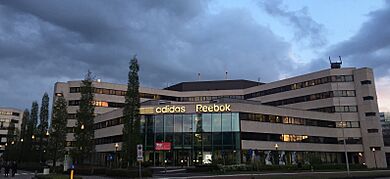
In 2010, Reebok announced a partnership with CrossFit, a fitness company. This included sponsoring the CrossFit Games, opening CrossFit studios, and creating a line of co-branded shoes and clothes. In 2011, Reebok started using the CrossFit delta symbol on its fitness clothing. As Reebok lost contracts to make sportswear for professional and college teams, it started focusing more on fitness, just like it did in the 1980s and early 1990s.
In 2013, Reebok announced another fitness partnership with Les Mills International. This deal included Reebok shoes and clothing in Les Mills' fitness programs. By July 2013, the red delta sign started appearing on Reebok's fitness collections. The brand announced it was replacing its old vector logo with the delta sign. This was the company's second logo change in over 120 years. The delta symbol represents three parts of positive self-change: mental, physical, and social. Reebok was growing its presence in yoga, dance, aerobics, and CrossFit.
After successfully bringing back many of its popular shoes and clothes from the early 1990s, Reebok announced an update in November 2019. It brought back the 1992 vector logo and the original "Reebok" writing. These were restored as the company's main brand identity. This was because customers still recognized these logos more than the red delta logo. However, the delta logo continued to be used on some fitness lines.
Authentic Brands Group Ownership
In February 2021, Adidas announced plans to sell Reebok. After looking at different options, Adidas expected to lose about €250 million from the costs of selling the business. In July 2021, Adidas narrowed down the potential buyers for the brand. The final companies were Wolverine World Wide and Authentic Brands Group (working together), and private equity companies like Advent International and CVC. The deadline for bids was August 2021.
On August 12, 2021, it was announced that Authentic Brands Group would buy the Reebok brand from Adidas for at least $2.5 billion. The deal was completed on March 1, 2022.
Reebok Logo History
Reebok Offices
Reebok's main global office is in Boston, Massachusetts, in the Seaport District. In Europe, the Middle East, and Africa (EMEA), Authentic Brands Group works with other companies. These include Bounty Apparel in South Africa, Al Boom Marine in the Middle East and North Africa, and Flo Magazacilik in Turkey. These partnerships help grow the business in those regions.
Reebok Products
Reebok designs, makes, sells, and distributes sportswear for fitness, running, and CrossFit. This includes clothing and accessories. The company has released many famous shoe styles. In 1982, it introduced the Reebok Freestyle, which was made just for women. By 1984, this shoe made up more than half of Reebok's sales. The company then released similar styles like the Princess, Empress, and Dutchess lines. Following the aerobics trend of the 1980s and early 1990s, Reebok started workout programs called Reebok Step in 1989.
To compete with Nike Air, Reebok introduced Energy Return System (ERS) in 1987. This system used horizontal cylinders in the shoe's middle sole to act like springs. It was later replaced by "Hexalite" cushioning. In 1989, the brand introduced one of its most famous shoes, the Reebok Pump. This was a men's basketball shoe. It was the first shoe with an adjustable fit that you could control by adding air. The Reebok Ventilator, a line of light athletic shoes with vented sides, first came out in 1990.
In 1996, Reebok signed a $50 million deal with Allen Iverson when he joined the Philadelphia 76ers. Iverson worked with Reebok to create the second-longest running basketball shoe line in history. It started with the Question shoe in 1996 and ended with Answer XIV.
In 2010, the brand released Reebok Zig. This was a new shoe technology and collection with zigzag foam soles. These soles were designed to help athletes move forward. The Reebok Nano was released in 2011 as the first official CrossFit shoe. The company has also partnered with Les Mills and CrossFit to make more fitness clothing, shoes, and workouts. In 2014, Reebok introduced Z-Series foam on the ZQuick TR shoe, featuring Reebok's new delta logo. This foam is a mix of dense middle and outer sole foam that is cushioned but strong.
Reebok's Future innovation house has developed a new technology called Liquid Factory. A robot can create shoe parts by squeezing out liquid polyurethane. This means they don't need to use traditional shoe molds.
In 2017, the UFC announced a new line called Fight Night Collection. This included an improved version of the Reebok-branded clothing.
Reebok Endorsements
Asia
Reebok sponsored uniforms for top Indian Football clubs like Mohun Bagan AC (2006–2011) and East Bengal FC (2003–2005, 2006–2010). Later, it sponsored uniforms for Indian Premier League teams. These included the Royal Challengers Bangalore, Kolkata Knight Riders, Rajasthan Royals, and Chennai Super Kings in 2008. For the 2009 season, sponsorships included Royal Challengers Bangalore, Kolkata Knight Riders, Chennai Super Kings, and Kings XI Punjab uniforms. Indian Cricket player Mahendra Singh Dhoni and Bollywood star Bipasha Basu promoted Reebok shoes together in 2009.
One of Reebok's most famous athletes, Indian cricketer Mahendra Singh Dhoni, was named by Forbes as one of the world's highest-paid sportspersons in June 2012. At that time, Dhoni promoted over 20 other brands in deals worth a total of $23 million.
Central America
In September 2022, the Panamanian Football Federation (FEPAFUT) announced a sponsorship deal with Reebok. This agreement runs from January 2023 through December 2026. Reebok provides official match uniforms, training clothes, and camp gear for all national football teams. This includes men's and women's teams of all ages, as well as the national futsal and beach soccer teams.
This deal marks Reebok's return as a sponsor of FEPAFUT. They had previously partnered between 1996 and 1997. According to FEPAFUT president Manuel Arias, this partnership is a big investment in Panamanian football. It aims to help the sport grow and compete internationally.
Reebok, which is run in Latin America by the Fashion Fitness Group, confirmed its commitment to supporting Panamanian athletes. Leon Falic, president of Reebok Panama, highlighted the brand's focus on high-performance products. He also mentioned its connection with the goals of Panamanian football fans and athletes.
Europe
The company kept its connection to its English roots through a long-term sponsorship with Bolton Wanderers. This is a League One football club. However, in 2009, Bolton changed its sponsorship. When the team moved to a new stadium in the late 1990s, their new home was named the Reebok Stadium.
Several other English clubs, like Liverpool F.C., had Reebok sponsorship deals until Adidas bought Reebok. Most of these clubs have since switched to Adidas or another company. In April 2014, Bolton Wanderers announced that the Reebok Stadium would be renamed. This was part of a new sponsorship deal with sportswear maker Macron. Macron now makes the club's uniforms and sponsors the stadium, which is called Macron Stadium. In Germany, Reebok sponsored the football club 1. FC Köln.
In rugby union, Reebok sponsored the Wales national team until late 2008. The team won the Grand Slam in the Six Nations Championship that year. Reebok also sponsored the Tasman Makos in New Zealand's domestic competition.
Reebok has several sponsorship deals with European basketball teams. These include Hapoel Tel Aviv BC of the Israeli Basketball Premier League and the EuroCup Basketball.
In 2006, Arsenal and France national team striker Thierry Henry signed a deal to join the "I Am What I Am" campaign. Manchester United winger Ryan Giggs also appeared in "I Am What I Am" commercials. Andriy Shevchenko started his endorsement deal with the company in 2006.
In fall 2024, it was announced that Reebok would be the uniform sponsor for the Leigh Leopards Rugby League team in the UK Betfred Super League for the 2025 season. Leigh is close to Bolton, where the brand started.
Russia
On March 21, 2022, Reebok stopped all its branded stores and online sales in Russia. This happened after Russia's invasion of Ukraine.
On May 30, 2023, it was reported that Reebok's business in Russia was transferred to Turkish FLO Retailing. It was rebranded as "SneakerBox." FLO Retailing has been making Reebok-branded products in Turkish factories for several countries. Reebok merchandise is available on the Sneakerbox website in Russia.
After brands like Reebok, Nike, Adidas, and Puma left Russia, sneakers and goods entered the country through other ways or as fake products.
North America
In 2004, Reebok made a deal to have the rights to make Canadian Football League (CFL) on-field jerseys, sideline gear, and footwear. This deal ended in 2015.
In Mexico, Reebok provided uniforms for Chivas de Guadalajara before the team was taken over by parent company Adidas in 2011.
United States
Reebok shoes were shown in the Nickelodeon game show Double Dare in the 1980s. Reebok products were also used in the Super Mario Bros. live-action film.
Reebok signed Venus Williams after she won singles titles at Wimbledon and the 2000 Summer Olympics. From 2002 to 2012, the company had the exclusive rights to make and sell both real and replica uniform jerseys, sideline clothing, caps, and on-field football footwear (called NFL Equipment) for the teams of the National Football League (NFL).
In 2004, Reebok signed a four-year deal to be the official shoe supplier to Major League Baseball (MLB). It also became the exclusive clothing provider for the 29 teams in the NBA and 16 WNBA teams for ten years, starting in the 2004–2005 season. This deal also added the Reebok vector logo to the 2004 U.S. Olympic basketball team's uniforms.
Reebok had the rights to produce the on-ice Edge Uniform System, performance clothing, and training footwear for the National Hockey League (NHL). This was a 10-year agreement from 2007 to 2017.
On December 2, 2014, the Ultimate Fighting Championship (UFC) announced a six-year deal with Reebok. This partnership began in July 2015.
In July 2018, Reebok Boston Track Club announced that coach Chris Fox from Syracuse University would lead it.
Oceania
In 2005, Reebok also signed a special agreement to design and supply all eight team uniforms for the new Australian A-League competition. This partnership was good for Reebok because football and the league were becoming more popular in the area. An estimated 125,000 A-League jerseys were sold in Australia. This was a record for a single league's sales in a year for a sports manufacturer. Reebok's agreement ended at the end of the 2010–11 season. On September 29, 2022, Reebok announced a partnership with the National Basketball League (NBL). It became the official footwear partner for the 2022–23 season.
South America
Reebok provided uniforms for Brazilian clubs like Cruzeiro, Vasco, International, and São Paulo FC. It also sponsored Argentine club Banfield, Paraguayan club General Díaz, and Uruguayan club Peñarol. Reebok also sponsored several national teams, such as Argentina, Chile, Colombia, and Paraguay.
In November 2022, the company announced its return to football. It signed a new deal with Brazilian club Botafogo. In January 2025, Chilean club Unión Española announced a new deal with Reebok.
Other Endorsements
New York rapper Jay-Z was the first non-athlete to get a special shoe from Reebok. The "S. Carter Collection by Rbk" launched on November 21, 2002. The S. Carter sneaker became the fastest-selling shoe in the company's history. Later, Reebok also made a deal with rapper 50 Cent to release a line of G-Unit sneakers. Rapper Nelly and violinist Miri Ben-Ari also became spokespersons for the company. Reebok also signed actress Scarlett Johansson. She introduced her own line of clothing and footwear called Scarlett Hearts, which was part of the Rbk Lifestyle Collection. The company also makes shoes for Emporio Armani under the label EA7. Other famous people who have worked with Reebok include Ariana Grande, Gal Gadot, Gigi Hadid, Victoria Beckham, Cardi B, and Camille Kostek.
Helping Communities
The Reebok Foundation runs a program called "Build Our Kids' Success" (BOKS). This program provides physical activities for US schoolchildren before the school day starts. Reebok helps fund this program with direct money and by giving a percentage of its shoe sales.
See also
 In Spanish: Reebok para niños
In Spanish: Reebok para niños
 | Roy Wilkins |
 | John Lewis |
 | Linda Carol Brown |


